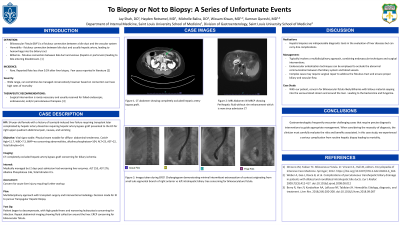Sunday Poster Session
Category: Liver
P1067 - To Biopsy or Not to Biopsy: A Series of Unfortunate Events
Sunday, October 22, 2023
3:30 PM - 7:00 PM PT
Location: Exhibit Hall

Has Audio
- JS
Jay Shah, DO
Saint Louis University
St. Louis, MO
Presenting Author(s)
Jay Shah, DO, Hayden Rotramel, MD, Michelle Baliss, DO
Saint Louis University, St. Louis, MO
Introduction: Biliovascular fistula (BVF) is a rare complication of liver biopsy characterized by the formation of a communication between the hepatic duct and portal vein. BVFs are typically self-limiting and do not routinely require intervention. In rare cases, BVFs can lead to persistent bacteremia and can be associated with increased mortality. We present a challenging case of BVF following transjugular liver biopsy (TJLB).
Case Description/Methods: A 54-year-old female with a history of isoniazid-induced liver failure 3 years prior requiring transplant complicated by hepatic artery dissection requiring hepatic artery bypass graft presented with right upper quadrant pain and vomiting. Labs on admission were notable for normal liver chemistries and a positive COVID-19 test. CT revealed a completely occluded hepatic artery bypass graft with concern for ischemic biliopathy, which was initially managed medically. Due to a new and worsening hepatocellular injury on subsequent labs, TJLB was pursued for further evaluation and confirmed the diagnosis of ischemic biliopathy. Soon after, she became febrile, and a cholestatic pattern of liver injury emerged. Endoscopic retrograde cholangiopancreatography (ERCP) was notable for a BVF and hemobilia, and a biliary stent was placed. Serial imaging continued to demonstrate evolving fluid collections along the porta hepatis requiring percutaneous drainage. The patient’s clinical status continued to deteriorate with persistent bacteremia and fungemia. Despite treatment with broad spectrum antibiotics and multiple endoscopic interventions, the patient ultimately passed away.
Discussion: The presented case highlights a rare but life threatening complication of liver biopsy and emphasizes the need for proper patient selection for this procedure. The management of BVFs typically involves a multidisciplinary approach, combining endovascular techniques and surgical interventions. Endovascular embolization techniques can be employed to occlude the abnormal communication between the biliary system and blood vessels. In more complex cases, surgical repair may be necessary to address the fistulous tract and ensure proper biliary and vascular flow. Hepatic biopsies are indispensable diagnostic tools in the evaluation of liver diseases. However, it is crucial to understand the potential complications.
Disclosures:
Jay Shah, DO, Hayden Rotramel, MD, Michelle Baliss, DO. P1067 - To Biopsy or Not to Biopsy: A Series of Unfortunate Events, ACG 2023 Annual Scientific Meeting Abstracts. Vancouver, BC, Canada: American College of Gastroenterology.
Saint Louis University, St. Louis, MO
Introduction: Biliovascular fistula (BVF) is a rare complication of liver biopsy characterized by the formation of a communication between the hepatic duct and portal vein. BVFs are typically self-limiting and do not routinely require intervention. In rare cases, BVFs can lead to persistent bacteremia and can be associated with increased mortality. We present a challenging case of BVF following transjugular liver biopsy (TJLB).
Case Description/Methods: A 54-year-old female with a history of isoniazid-induced liver failure 3 years prior requiring transplant complicated by hepatic artery dissection requiring hepatic artery bypass graft presented with right upper quadrant pain and vomiting. Labs on admission were notable for normal liver chemistries and a positive COVID-19 test. CT revealed a completely occluded hepatic artery bypass graft with concern for ischemic biliopathy, which was initially managed medically. Due to a new and worsening hepatocellular injury on subsequent labs, TJLB was pursued for further evaluation and confirmed the diagnosis of ischemic biliopathy. Soon after, she became febrile, and a cholestatic pattern of liver injury emerged. Endoscopic retrograde cholangiopancreatography (ERCP) was notable for a BVF and hemobilia, and a biliary stent was placed. Serial imaging continued to demonstrate evolving fluid collections along the porta hepatis requiring percutaneous drainage. The patient’s clinical status continued to deteriorate with persistent bacteremia and fungemia. Despite treatment with broad spectrum antibiotics and multiple endoscopic interventions, the patient ultimately passed away.
Discussion: The presented case highlights a rare but life threatening complication of liver biopsy and emphasizes the need for proper patient selection for this procedure. The management of BVFs typically involves a multidisciplinary approach, combining endovascular techniques and surgical interventions. Endovascular embolization techniques can be employed to occlude the abnormal communication between the biliary system and blood vessels. In more complex cases, surgical repair may be necessary to address the fistulous tract and ensure proper biliary and vascular flow. Hepatic biopsies are indispensable diagnostic tools in the evaluation of liver diseases. However, it is crucial to understand the potential complications.
Disclosures:
Jay Shah indicated no relevant financial relationships.
Hayden Rotramel indicated no relevant financial relationships.
Michelle Baliss indicated no relevant financial relationships.
Jay Shah, DO, Hayden Rotramel, MD, Michelle Baliss, DO. P1067 - To Biopsy or Not to Biopsy: A Series of Unfortunate Events, ACG 2023 Annual Scientific Meeting Abstracts. Vancouver, BC, Canada: American College of Gastroenterology.
